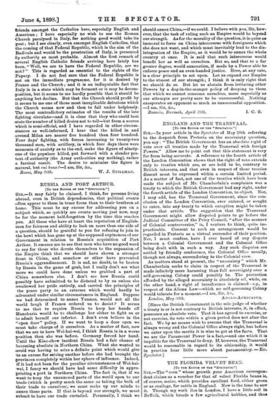ENGLAND AND THE TRANSVAAL.
[To TER EDITOR OP THR " SPECTAT0R:]
Sin,—In your article in the Spectator of May 2Sth referring to the despatch from Pretoria on the suzerainty question, you say : "The British Government has an absolute right of veto over all treaties made by the Transvaal with foreign Powers." Allow me to point out that this statement is very far from being accurate. A reference to the fourth article of the London Convention shows that the right of veto extends only to treaties which are, or are held to be, contrary to British interests, and that even in respect of these treaties dissent must be expressed within a certain limited period. As a matter of fact, not one of the treaties which have been made the subject of Mr. Chamberlain's complaints was a treaty to which the British Government had any right, under the fourth article of the London Convention, to object. Nor, I may add, has the Transvaal Government, since the con- clusion of the London Convention, ever entered, or sought to enter, into any treaty to which exception might be taken under that article. The suggestion that the Transvaal Government might allow disputed points to go before the Judicial Committee of the Privy Council, "after the manner of Colonial controversies," is, I venture to think, quite im- practicable. Consent to such an arrangement would be regarded in Pretoria as a virtual surrender of their position. Nor, I must confess, have I ever heard of any dispute between a Colonial Government and the Colonial Office being dealt with in such a way. Any such disputes are settled by friendly conference, the Colonial Office usually, though not always, surrendering to the Colonial view.
As matters stand at present, the " suzerainty " which Mr. Chamberlain seeks to claim in respect of the Transvaal is made infinitely more harassing than full sovereignty over a self-governing Colony could possibly be. The protection afforded by the alleged suzerainty is absolutely nil, while, on the other hand, a right of interference is claimed—e.g., in respect of the Aliens Law—which no self-governing Colony would tolerate for a moment.—I am, Sir, &c., [Since the British Government is the sole judge of whether a treaty is or is not contrary to British interests, it, in effect, possesses an absolute veto. That it has agreed to exercise, or not exercise, its veto within a given period does not alter the fact. We by no means wish to assume that the Transvaal is always wrong and the Colonial Office always right, but before we enter upon the merits it is wise to get at the facts. That we are the Paramount Power is a fact,—and one which it is impolitic for the Transvaal to deny. If, however, the Transvaal would be reasonable in regard to its citizenship, it would in practice hear little more about paramountcy. —ED. Spectator.]


































 Previous page
Previous page